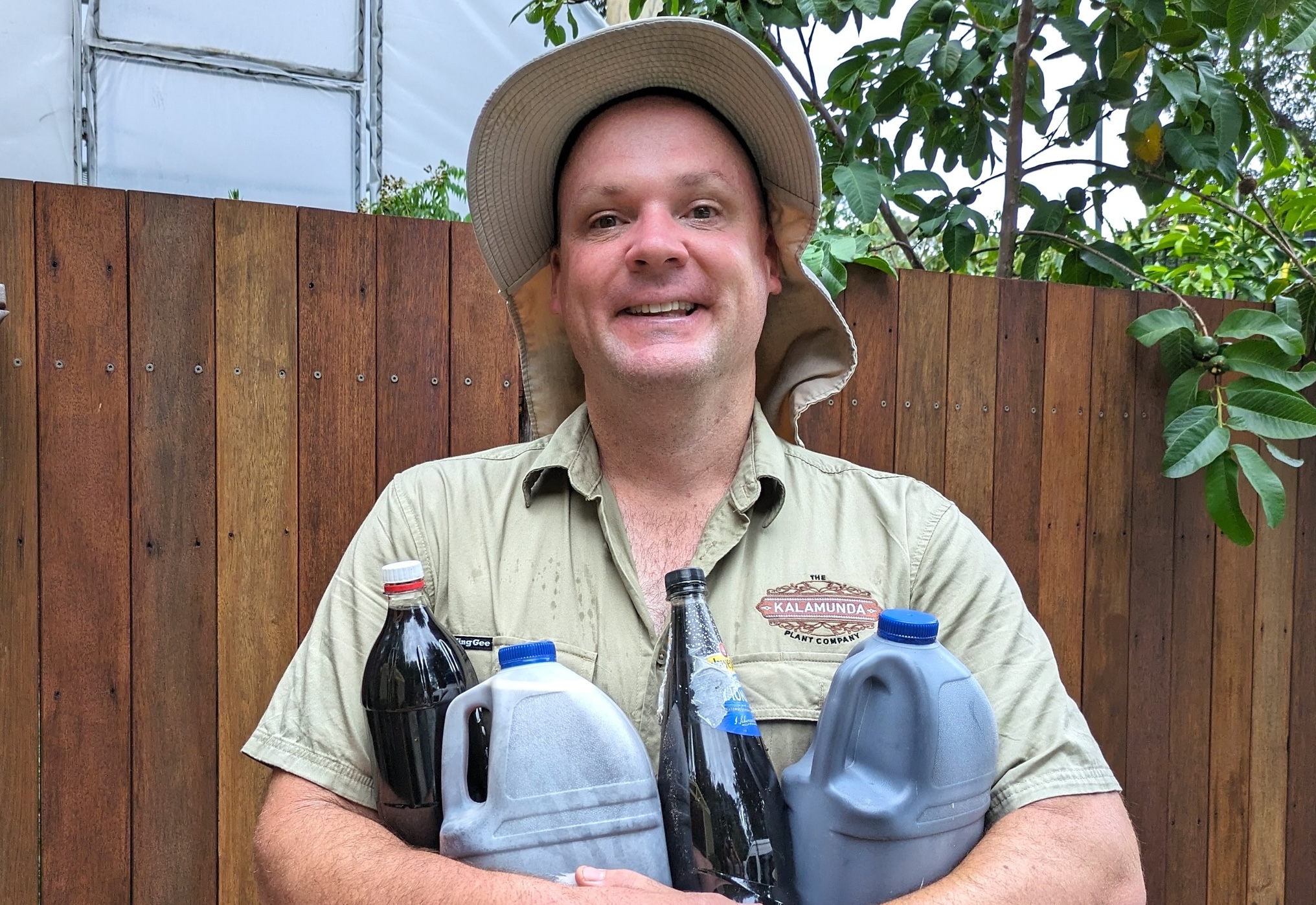For some people, branded fertilisers sold at nurseries are ideal and that’s great, but for me and a growing number of others, making our own fertilisers is far more appealing. I have all the ingredients I need around the home to make my own natural fertilisers and I get great results.
Some of the advantages of making your own fertilisers include:
* There’s no cost.
* You know exactly what’s going into your fertiliser and into your garden.
* There’s no packaging.
* No transport is needed, so there’s no lugging your products around the state or country.
* Your fertiliser is made from natural ingredients.
* Your fertiliser will contain heaps of beneficial organisms that lots of commercial fertilisers can lack.
* Your fertiliser is essentially made from ingredients often regarded as waste.
Here’s some basic home fertilisers I use…
Worm Tea.
This is probably my favourite. Chuck a big handful of worm castings (worm poo) into a hessian bag and suspend it in a bucket of water. Pop an aerator in the water and leave it overnight. If you can use rainwater rather than tap water, that would be brilliant. Use the liquid with water at a ratio of 1 : 10 (one part liquid to ten parts water).
Weed Fertiliser.
This is a really easy one to make. I use all kinds of weeds from my garden. The best ones are deep rooted plants like dandelion, nettle and comfrey. Simply fill your container with 1 part weeds to 5 parts water. Pop the lid on and leave it for about four weeks. The end product stinks. Use the liquid with water at a ratio of 1 : 10.
Banana Peel Fertiliser.
I pop about ten banana peels in about 3L of water for a few days, then use the liquid with water at a ratio of 1 : 10. The minerals (phosphorus, calcium and potassium, among others) and nutrients will leach into the water.
Kitchen Cooking Water.
When we boil vegetables, pasta and eggs in the kitchen, nutrients are released into the water. Instead of pouring these goodies down the drain, wait for the water to cool first (very important) then pour it on the garden.
Sheep and Cow Manure Extract.
Pop a good couple of handfuls of aged manure in a hessian bag and suspend it in a bucket of water for about an hour before use. Use the mixture with water at a rate of 1 : 10.
Sheep and Cow Manure Tea.
Pop the aged manure in a hessian bag and place it in a bucket. 1 part manure to 5 parts water. Aerate the liquid for 24 hours. Or you can secure the lid and leave it for a couple of weeks without the aerator. Use it with water at a ratio of 1 : 10. This liquid will provide a great source of nitrogen. Don’t use manure from cats and dogs as it can contain unwanted pathogens.
Compost Tea.
Grab a bucket and add one part compost to four parts water. Pop a small aerator in the mix and that’ll help build a bigger colony of goodies. Leave it overnight. Use the liquid with water at a ratio of 1 : 10. With things like compost teas, we tend not to focus just on the nutrient content, which could be minimal, but rather the micro-organisms it contains.
Note: You might be wondering at this point what the difference is between ‘Extract’ and ‘Tea’. An extract is simply submerging mature compost or manure for example, in water and allowing the nutrients to leach out, whereas tea is the liquid that has been ‘brewed’ by oxygenation and stimulating microbial growth. Extracts are easy but teas (if done properly) have more nutrients and minerals. They also offer a lovely mix of fungi, bacteria, nematodes and protozoa.
Orange and Lemon Peel Fertiliser.
I dry my citrus peels then crush them into a powder. The citrus peel is high in potassium. This generally works for all kinds of peels.
Molasses Soil Improver.
Add 10 tablespoons of molasses (without a sulphur preservative added) to 10L of water. Mix it and disperse it over the soil. Molasses is great for increasing the beneficial bacteria and microbes in the soil.
Egg Shells.
I crush my egg shells into a powder then scatter them around the soil. Egg shells contain trace elements, calcium, phosphoric acid and nitrogen. They can help reduce soil acidity and improve soil fertility.
You don’t need to spend big bucks on branded fertilisers. There’s loads of different fertilisers you can make at home.

